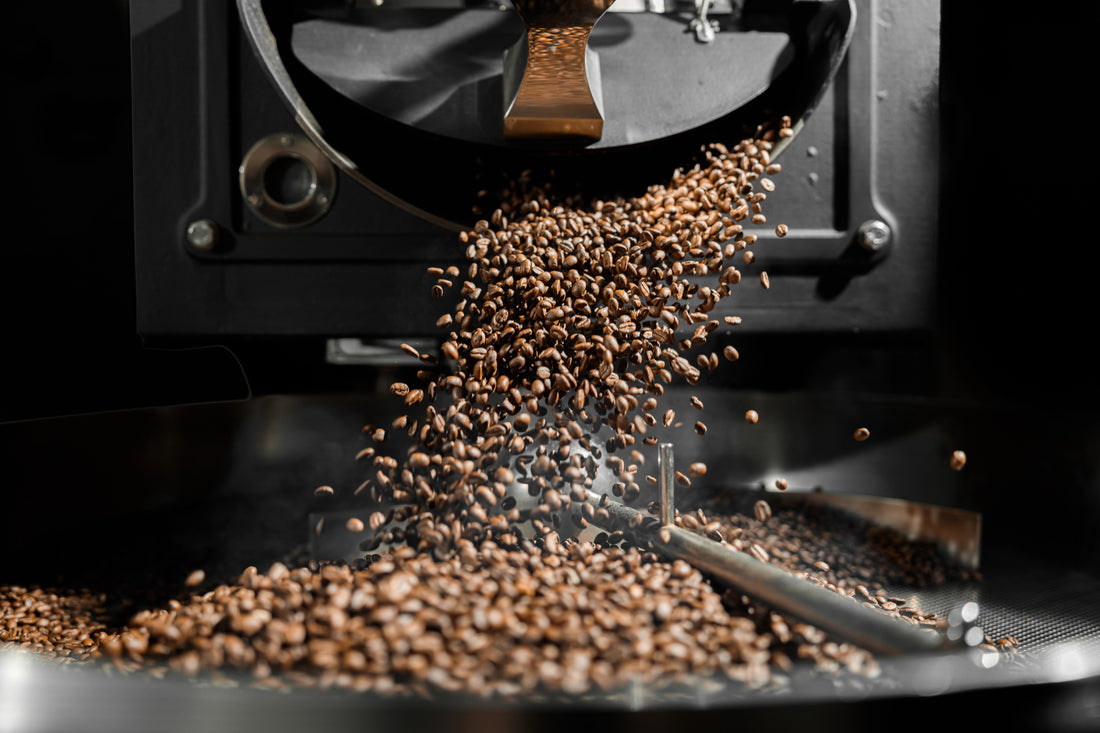
Everything you need to know about Artisanal Coffee Roasting: Techniques, Impact and Flavors
Share
Artisan coffee roasting is more than just transforming green beans into roasted coffee. It is a complex combination of science, art, tradition, and innovation. This delicate process requires a deep understanding of chemical reactions, coffee varieties, and taste preferences. This article delves deep into the fascinating world of artisanal coffee roasting.
The Origin of Coffee Beans: The Foundation of Quality
The quality of a coffee begins long before roasting. It is based on the selection of green coffee beans, which are the seeds of the coffee tree fruit. The region where the beans are grown, the climate, altitude, soil and farming practices all play a crucial role in developing the characteristics of the beans.

Source: https://www.cafeimports.com/europe/blog/maps/
Grain Selection:
Origin and Terroir: Coffee beans come from specific regions of the world, each with unique characteristics. African terroirs, for example, are known for their floral and fruity notes, while South American terroirs often offer more chocolatey and nutty profiles.
Coffee Varieties: There are several varieties of coffee, the most common of which are Arabica and Robusta. Arabica is valued for its smoothness and aromatic complexity, while Robusta is fuller-bodied and contains more caffeine.
Transformation Process:
Harvesting and Sorting: Coffee cherries are picked by hand or mechanically. The beans must then be sorted to remove defects and impurities.
Processing Methods : There are different methods of processing beans, such as wet processing (washed), dry processing (natural), and semi-wet processing (honey). Each method influences the final characteristics of the coffee.

Sources: https://www.belco.fr/
The Roasting Process: A Symphony of Chemical Reactions
Roasting is the process that transforms green beans into roasted beans, ready to be ground and brewed. This process involves complex chemical and physical changes that develop the aromas and flavors of coffee.

The Phases of Roasting:
Drying Phase: The grains lose their initial moisture. This step is crucial to prepare the grains for the caramelization of sugars.
Browning Phase: Maillard reactions begin, creating complex aromatic compounds. The beans turn a golden brown color.
First Cracking: At around 200°C, the beans burst due to the expansion of the water inside. This is a critical moment that signals that the beans are roasted and the aromatic oils are beginning to be released.
Development Phase: After the first crack, the roaster must decide how long the roast will last based on the desired flavor profile. This is where the magic happens, with the ability to create a wide range of flavor profiles.
Second Crackle: At higher temperatures, a second crack may occur, indicating a darker roast. At this point, the smoky and chocolatey notes become more pronounced.
Roasting Control:
Temperature and Time: Controlling temperature and time is essential. Roasting too quickly or too slowly can harm the development of aromas.
Chemical Reactions: Roasting involves thousands of chemical reactions, including the breakdown of chlorogenic acids, the caramelization of sugars, and the breakdown of proteins. These reactions produce the aromatic compounds and characteristic flavors of coffee.
The Importance of Craftsmanship: The Eye, Ear and Nose of the Roaster
Artisan roasting requires great skill and developed intuition. Experienced roasters use their senses to control the process.

The Eye:
Bean color is a key indicator of roasting progress. Roasters carefully observe color changes to determine roast stage.
The Ear:
The first and second cracks are essential auditory indicators. The first crack signals that the beans are in the flavor development phase, while the second crack indicates a darker roast.
The Nose:
The smell of the beans being roasted is another important indicator. Experienced roasters can detect aromas of caramel, chocolate, nuts and fruit, and adjust the process accordingly.
The Different Roasting Profiles: An Infinite Palette of Flavors
Artisan roasting allows for a variety of flavor profiles, providing a unique tasting experience for each type of coffee.
Light Roast:
Fruity and Floral Notes: Light roasts preserve the natural acidity and fruity notes of the coffee. They are ideal for specialty coffees where aromatic complexity is sought.
Bright Acidity: These coffees have a more pronounced acidity, often described as lively and bright.
Medium Roast:
Balance and Roundness: Medium roasts balance acidity and body, revealing notes of caramel, chocolate and nuts.
Versatility: This profile is versatile, suitable for various preparation methods, from espresso to French press.
Dark Roast:
Richness and Intensity: Dark roasts develop robust flavors of dark chocolate, tobacco and wood.
Low Acidity: These coffees have low acidity and a heavier body, perfect for lovers of full-bodied coffees.
Impact of Roasting on Taste: A Complex Chemical Transformation
Roasting profoundly alters the chemical compounds in coffee beans, transforming bland compounds into a complex blend of flavors and aromas.

Source: https://www.ethiquable.coop/
Chlorogenic Acids:
Initial Role: Present in large quantities in green beans, these acids contribute to the acidity of coffee.
Transformation: During roasting, chlorogenic acids break down, reducing acidity and contributing to flavor formation.
Sugars:
Caramelization: The sugars in the beans caramelize under heat, creating sweet and complex flavors.
Decomposition: Caramelization of sugars plays a key role in the development of caramel, toffee and chocolate notes.
The Environmental and Social Impact of Artisan Roasting
Artisan coffee roasting not only produces exceptional coffees, it also has a significant positive impact on the environment and local communities.
Sustainable and Ecological Practices
Carbon Footprint Reduction: Artisan roasters use more efficient and less energy-intensive roasting methods. Some use renewable energy sources, such as solar or wind, to reduce their reliance on fossil fuels.
Social and Ethical Commitment
Fair Trade: Artisan roasters often prioritize fair trade, ensuring that coffee farmers receive fair prices for their work. This helps improve farmers’ livelihoods and support sustainable communities.
Transparency and Traceability: Traceability is essential in craft roasting. Roasters often provide detailed information about the origin of the beans, the growing methods, and the social and environmental practices of the farms.
Community Development
Local Partnerships: Artisan roasters work closely with coffee producers to improve farming practices, increase bean quality and ensure fair prices.
Training and Education: Roasters also support training programs for farmers, improving their skills and knowledge in sustainable cultivation and management.
Innovation and Future of Artisan Roasting
Innovative Technologies: The use of advanced technologies, such as temperature sensors and profiling software, allows roasting parameters to be precisely monitored and adjusted to optimize quality.

Emerging Trends: Micro-lot production, where small quantities of coffee are grown, harvested and roasted with special attention, is growing in popularity. These coffees offer a unique experience and highlight the distinct characteristics of specific lots.
Conclusion: Artisan Roasting, An Evolving Art and Science
Artisan coffee roasting is a delicate alchemy, requiring a combination of science, know-how and passion. It transforms simple green beans into a complex sensory experience, capturing the essence of their terroir and the efforts of the producers.
Each cup of artisan coffee is a celebration of this meticulous process, offering coffee lovers an endless palette of flavors to explore. By valuing sustainability, ethics, and innovation, artisan roasters continue to push the boundaries of quality and creativity, while respecting the centuries-old traditions of roasting.
The future of craft roasting looks bright, with increasing attention to quality, transparency, and social and environmental impact. Consumers are increasingly aware of these aspects and are willing to support products that respect these values.
For coffee enthusiasts, artisan roasting offers a unique opportunity to discover and appreciate the hard work, innovation and dedication that goes into every cup. Whether you’re a curious amateur or a seasoned connoisseur, each sip of artisan coffee invites you on a sensory journey through the world’s terroirs and the expert hands of artisan roasters.

